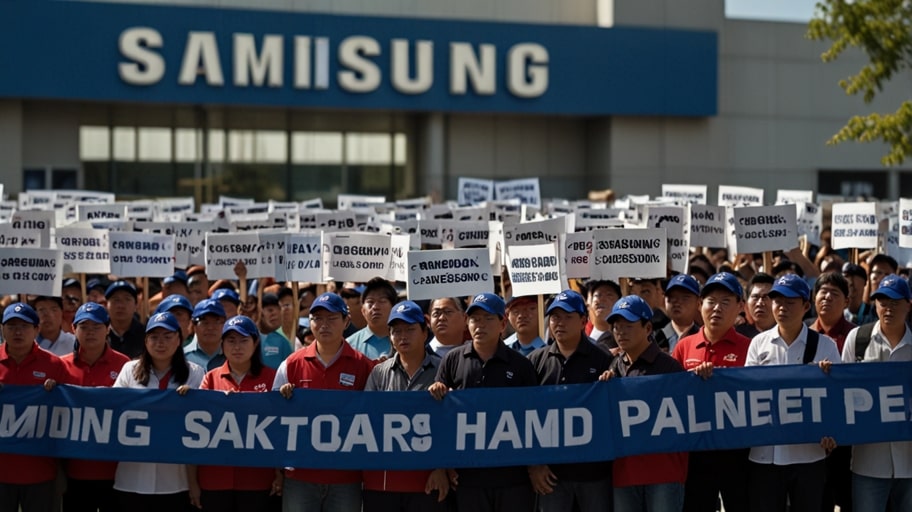With thousands of unionised workers pressing two-day strikes, South Korea is experiencing its first-ever big strike between Samsung Electronics workers because the company has failed to offer them improved wages and benefits. The move, which started on June 16, 2025, poses a risk of disrupting world supply chains of semiconductors that are already overloading due to geopolitical tensions.
Demands by Unions Get Higher
The National Conference of Unification, which includes more than 30,000 Samsung workers, refused the proposal of a 5.1 percent wage escalation. People want a 10 percent increase in wages and an enhancement of bonuses, citing Samsung’s record profit of 50 billion dollars in 2024. The determination of the union marks a change in labor in South Korea.
Effect on Chip Manufacture
Samsung is the world’s largest memory chip firm, producing 40 percent of NAND flash and 20 percent of the DRAM chips. The strike at its Hwaseong plant may freeze the production lines. Analysts predict direct shortages in smartphones, PCs, and the auto industry in most regions of the globe.
Risk on Global Supply Chain
Hope that the strike will take place is essential. Chip demand is skyrocketing, and Taiwanese TSMC is already battling its problems, so Samsung coming in could only worsen it. Memory chip prices are already appreciating, and extended enforcement can encourage tech titans to look elsewhere to the extent that small suppliers are stressed.
The Technology of Samsung in Question
Samsung’s management has minimized the effects of the strike, saying that contingency plans would ensure that output is not affected. But sources report slowdowns in production. The company has been criticized for being unwilling to negotiate union demands; some state that it only cares about shareholder-based value as opposed to the welfare of the worker.
South Korean Labor Change
Historically, the company has escaped major labor unrest because it is non-unionised. The strike is an indication of the increasing worker empowerment in South Korea, where unions are picking up momentum. It would even create the same trend in other companies, such as SK Hynix, and the industry labor forces would transform.
Economic implications of South Korea
Samsung contributes 15 percent of South Korea’s GDP. An extended dispute would hurt economic growth, considering that exports are the country’s main economic driver. To avoid provoking an escalated conflict, the government has been encouraging dialogue and is under pressure not to take sides in such a high-stakes conflict.
Shareholders are Growing Frantic
Investors were wary, and Samsung shares went down by 3 percent at the Seoul stock exchange on June 16. Although a company has cash reserves as a cushion, prolonged warfare may waste trust. The analysts expect short-term volatile markets as the markets weigh the duration and effect of the strike.
Geopolitical Ripples
The strike is amid tensions between the U.S. and China in chip supply chains. Samsung is a linchpin as a geopolitical supplier. The advances might also encourage the U.S. and Europe to diversify the production of semiconductors further so that they are less dependent on Asian players.
Strategic timing of the Union
The strike occurred precisely when demand for chips was the highest, augmenting the bargaining power of the union. The labor force is also on strike against what is considered to be anti-union issues of surveillance and intimidation by Samsung. This open position has won sympathy, and Samsung is under pressure to negotiate fast.
Technological Advantage of Samsung under Fire
Samsung’s leadership position over sophisticated chips, such as the 3nm processor, depends on production continuity. A lasting lockout would disorient R&D and cause it to lose its foothold to competitors such as TSMC. As negotiations stall, the company’s future in staying ahead of its technology rivals hangs in the balance.
The Tech Industry is on its Toes Global
Apple, Nvidia, and other Tech giants rely on Samsung chips. A supply shortage may slow down product releases and increase expenses. Smaller companies, incapable of covering price changes, can be on the verge of extinction, which shows how vulnerable the global tech environment is.
Squabbling Stubble
Negotiations between Samsung and the union are still at a standstill. The company has introduced a one-off bonus, but workers are insisting on structural changes. Mediators were invited, although they seem to be stuck in their position, leaving fear of a prolonged standoff that may have international consequences.
The Voices of Workers Increase
Employees such as Park Ji-hoon, with 10 years of experience at Samsung, consider it a matter of dignity to go on strike. According to him, 10 years at Samsung have not produced many benefits: he claims that not only does he drive Samsung’s success, but he also receives comparatively little reward. The songs sound potent, and South Korean society has growing support for the union cause.
Possible Solutions Routes
Observers also indicate that Samsung can compromise by combining pay rises and stock packages. However, the union’s request for a transparent method of calculating the bonuses makes the case messy. A quick decision is vital in preventing further damage to Samsung’s image and business.
Coming to a Turning Point in Samsung
The strike is a watershed incident for Samsung. How it handles this crisis will determine its labor policies and world status. Refusing to resolve the dispute might encourage unions on a whole industry scale, whereas a resolution can lead to introducing a better approach toward workers.
